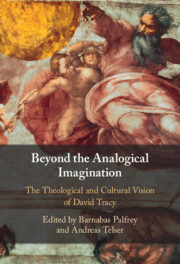Book contents
- Beyond the Analogical Imagination
- Reviews
- Beyond the Analogical Imagination
- Copyright page
- Epigraph
- Contents
- Contributors
- Acknowledgements
- Introduction
- Part I Theology and Culture
- Part II Public and Beyond
- Chapter 4 Theology in the Public Realm? David Tracy and Contemporary African Religiosity
- Chapter 5 From Public to Street Theology
- Chapter 6 Conversational Reason
- Part III Church and World
- Part IV From David Tracy
- Part V Post-Script
- Bibliography
- Index
Chapter 6 - Conversational Reason
Ambiguities and Interruptions in a Digital Age
from Part II - Public and Beyond
Published online by Cambridge University Press: 28 September 2023
- Beyond the Analogical Imagination
- Reviews
- Beyond the Analogical Imagination
- Copyright page
- Epigraph
- Contents
- Contributors
- Acknowledgements
- Introduction
- Part I Theology and Culture
- Part II Public and Beyond
- Chapter 4 Theology in the Public Realm? David Tracy and Contemporary African Religiosity
- Chapter 5 From Public to Street Theology
- Chapter 6 Conversational Reason
- Part III Church and World
- Part IV From David Tracy
- Part V Post-Script
- Bibliography
- Index
Summary
This essay approaches David Tracy’s theme of conversation (‘which animates … the whole posture and method of Tracy’s career’) primarily as social and civil practice. Tracy’s Plurality and Ambiguity (1987) is brought into conversation with present-day cultural critic Sherry Turkle regarding how digitalised communications magnify the ‘interruptions’ of plurality and ambiguity that Tracy suggested mark all conversation. Some early critics suggested that Plurality and Ambiguity: (1) insufficiently considered the ambiguities of one’s interlocutors in conversation; and (2) ignored imperatives for some participants to resist powerful others’ framings of the rational task. Here, our digital situation can help highlight how deep down plurality and ambiguity stretch within any given conversation; as well as how socially fragile and crucial this phenomenon of conversation is. The world of deliberately designed digital platforms highlights how there is always some particular design to ‘the table’ at which conversation participants convene. Theology must learn the necessity of building a culture of genuine theological conversation by means of deliberate and detailed design decisions.
Keywords
- Type
- Chapter
- Information
- Beyond the Analogical ImaginationThe Theological and Cultural Vision of David Tracy, pp. 130 - 152Publisher: Cambridge University PressPrint publication year: 2023

